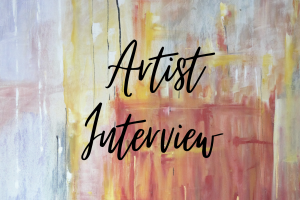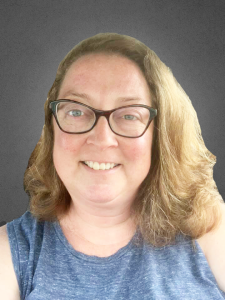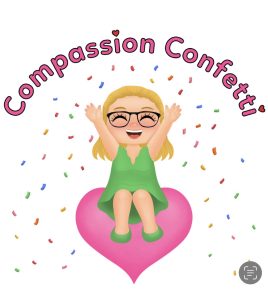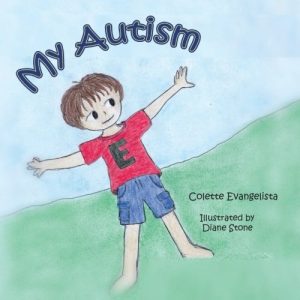Laughter Is a Way of Life: An Interview with Colette Evangelista
 Today’s guest and I go way back. We both attended junior high together and reconnected via Facebook many years ago. One of the things I remember most about Colette Evangelista when we were tweens (though that term probably didn’t exist then) was how fun she was. Though I didn’t tell her at the time, just being around Colette made life a little more joyous; she was able to go with the flow far better than I ever could (or at least it seemed that way). Years later, Colette is a teacher in training at the Center for Mindful Self-Compassion, a certified life coach, and a certified teacher in elementary education. One of her most important roles, though, is as mother. She has two children, one of whom is autistic*. That child, Everett, is now a teenager, and Colette has culled her wisdom into a fabulous podcast called Compassion Confetti for Autism Moms, which is focused on the parent. Colette writes on her website, “I am here to make sure you are getting the all the nurturing and nourishment YOU need to flourish. Confetti is used in celebration. And you deserve to be celebrated. So, Compassion Confetti. Sprinkle that shit all over yourself.” Indeed. Colette is also an author; ten years ago, she wrote a picture book called My Autism, which is “written from a positive perspective in the voice of a child with autism. The ‘label’ is diffused to show that we are all different and we are all special.” Is another book in the works? Read on to find out! And thank you, Colette, for answering my questions and for generating this podcast. It’s an important one!
Today’s guest and I go way back. We both attended junior high together and reconnected via Facebook many years ago. One of the things I remember most about Colette Evangelista when we were tweens (though that term probably didn’t exist then) was how fun she was. Though I didn’t tell her at the time, just being around Colette made life a little more joyous; she was able to go with the flow far better than I ever could (or at least it seemed that way). Years later, Colette is a teacher in training at the Center for Mindful Self-Compassion, a certified life coach, and a certified teacher in elementary education. One of her most important roles, though, is as mother. She has two children, one of whom is autistic*. That child, Everett, is now a teenager, and Colette has culled her wisdom into a fabulous podcast called Compassion Confetti for Autism Moms, which is focused on the parent. Colette writes on her website, “I am here to make sure you are getting the all the nurturing and nourishment YOU need to flourish. Confetti is used in celebration. And you deserve to be celebrated. So, Compassion Confetti. Sprinkle that shit all over yourself.” Indeed. Colette is also an author; ten years ago, she wrote a picture book called My Autism, which is “written from a positive perspective in the voice of a child with autism. The ‘label’ is diffused to show that we are all different and we are all special.” Is another book in the works? Read on to find out! And thank you, Colette, for answering my questions and for generating this podcast. It’s an important one!
Christina: First, can you give us a little background about you, your son, and your journey to where you both are today?
Colette: My son was diagnosed at 2 years and 8 months. I had asked my doctor if he had a problem starting at about 8 months. Motherly intuition. It was many years of our family trying to “fix” the autism in our son Everett. We did every kind of intervention: diets, supplements, shots, chelation, ABA, RDI, etc. There was a lot of fear and worry, guilt and overwhelm. Going at a frantic pace to try to eradicate autism was not healthy for any of us. Or even truly plausible. So, a gentleness had to enter our lives for survival. Acceptance began to ease the uncertainty and fear. I still get triggered sometimes, but for the most part we know who we are and what we are capable of. Everett has a lot of anxiety and developmentally is 4 years old, but he is as sweet as honey and a joy to be around. As a special needs parent I wear a lot of labels: mom, caretaker, therapist, etc. Now I’m trying to get to know the “woman” label and hone in on living a balanced life that nurtures who I am. I sure have nurtured my son plenty. I deserve it too.
Christina: Compassion Confetti for Autism Moms is, as the title suggests, for parents, moms in particular. Why compassion confetti? What does compassion look like to you, and how hard was it for you to be compassionate with yourself?
Colette: A belief system within self-compassion is that in our shared humanity we can all be a little messy and imperfect. Life will always give you hard. But we must also find ways to acknowledge the beauty in life as well. So, confetti is celebratory and messy. It’s joyous with a “dang…that’s kind of a pain in the ass” aspect to it as well. Confetti is perfectly imperfect. Like us. And life.
Compassion for me is a lifeline. When I feel alone and unloved, scared or overwhelmed, I turn to it to anchor myself. It is a conscious effort to sooth myself and treat myself with warm tenderness when I am hurting. Life can hurt. There is no avoiding that. But I make it a practice to try to be as gentle and kind to myself when I am experiencing big emotions or challenging situations.
At first, I didn’t even know how to begin to care for myself. Where to start. I just knew I was drowning and couldn’t survive anymore. I felt so alone. The truth is that not all of us are blessed to have strong support systems around us. I had to become my own support system. I needed love and care from somewhere. And self-compassion was the answer. So now I ask myself what I really need in the moment and then I try to honor that. It’s a practice that is strengthening and I am so grateful for it.

Christina: Compassion Confetti gets to the heart of what it’s like to raise a child with autism, highlighting shared experiences. What have you learned from those shared experiences? What is the number one thing you’d tell parents who are just learning about their child’s autism?
Colette: Having shared experience is such a gift. It takes you out of isolation and into the comfort of a community that understands, people that can empathize with all the complex emotions and responsibilities that go hand in hand with being a special needs caretaker.
The number one thing I would tell a newly diagnosed family is to take a breath, pace yourself, and don’t listen to the limitations. Also, let yourself be a “good enough” parent. We deserve the space imperfection provides to rest our nervous systems. Being on high alert all the time is exhausting and depleting. So rest. Find the time.
Christina: What made you finally decide to put together a podcast? Why that forum in particular?
Colette: I have wanted to do a podcast for 7 years. The fear of technology held me back. I was listening to a podcast and the life coach on it said “if you come across an obstacle you have to problem solve how to get past it.” So I hired help. A woman does all the technology. It is reasonably priced and it is worth every penny because I love that I get to talk people’s ears off and not worry about the techy things.
Christina: I especially love this part of your podcast opening: “Let’s open our hearts, turn on our ears, and get to listening.” That’s it, Colette. At the crux of life, if we all did that a little more, we’d understand people better and have more compassion for what they’re going through. Where did this come from? Did you have any other phrases on the short list?
Colette: I have no idea where the “open our hearts . . . get to listening” came from. It came out while I was recording. But it worked, so there. But you are right. Maybe if we all did a little more opening up our hearts and listening with our ears the world would experience more love and magic. Definitely a concept to apply as we navigate our lovely, crazy human experiences.
Christina: Be honest–what do you think about your podcaster voice? I love it. I think you’re so well-suited to this new gig! Do you listen and critique yourself?
Colette: I have heard my whole life that I have a very distinctive voice. I kind of love it to be honest.
Listening to the podcast is an exercise in self-compassion. All you want to do is second guess every second of it with lots of “I should haves.” You know that “shoulding” on yourself sucks. So I try to listen and just let it all go. I remind myself I don’t have to be perfect and if a point was missed I can maybe cover it another time.
Christina: One of the most engaging parts of the podcast is how much you and your guests laugh. Is laughter a form of medicine for you?
Colette: Laughter is a way of life for me. I just love it. It opens everything up with light and love. I feel so blessed to have these incredible people come on and we see the humor in some of our circumstances. We need that fresh clean air to blow out the stagnate “stuff” that can clog our joy.
Christina: You’re also an author, and you released My Autism over a decade ago. The book “is a social story meant to build self-esteem in children on the spectrum as well as nurturing acceptance and understanding among their peers.” Now that your son is older, do you think you have another book in you?
Colette: I so have a book in me. I write lots of it in my head and some is captured in written form. Great stories that crack me up. Ones that I look back on with a heavy heart. Maybe I should do a short-story compilation!
Christina: Any quick tips for parents?
Colette: Find your closest autism support group. Get on a Facebook page for autism caregivers. Do anything that connects you to people who understand and care. Have Zoom dance parties with other autism caregivers if you can’t get out of the house. YOU ARE NOT ALONE. WE CAN DO HARD THINGS. WE GOT THIS.
Colette and Compassion Confetti for Autism Moms can be found in multiple places!
Website: https://www.compassionconfetti.com/
Instagram: @compassionconfetti
Facebook: Compassion Confetti for Autism Moms
Thanks to Colette for agreeing to this interview! If you know of an artist, author, or podcaster who’d like to be featured in an interview (or you are an author who would like to be featured), feel free to leave a comment or email me via my contact page.
*Side note: I did a little digging into language regarding autism, which includes identity-first and people-first language. Some interesting research on the topic can be found here. The respondents in the survey, many of whom identify as being on the ASD spectrum, say they would prefer identity-first language (“autistic person”) versus people-first (“person with autism”). My own daughter, who was diagnosed last summer, agrees with the survey and said she prefers to say she “is autistic,” but healthcare professionals in my area and elsewhere (as well as some journalists) prefer people-first language. My point? In this interview, you’ll see both approaches.



Yay!! I feel so blessed to be asked to share my experiences. Love to you Christina and all your precious followers, family, and friends.
So glad you did!! Thanks again, and keep up the good work. I really love the podcast.